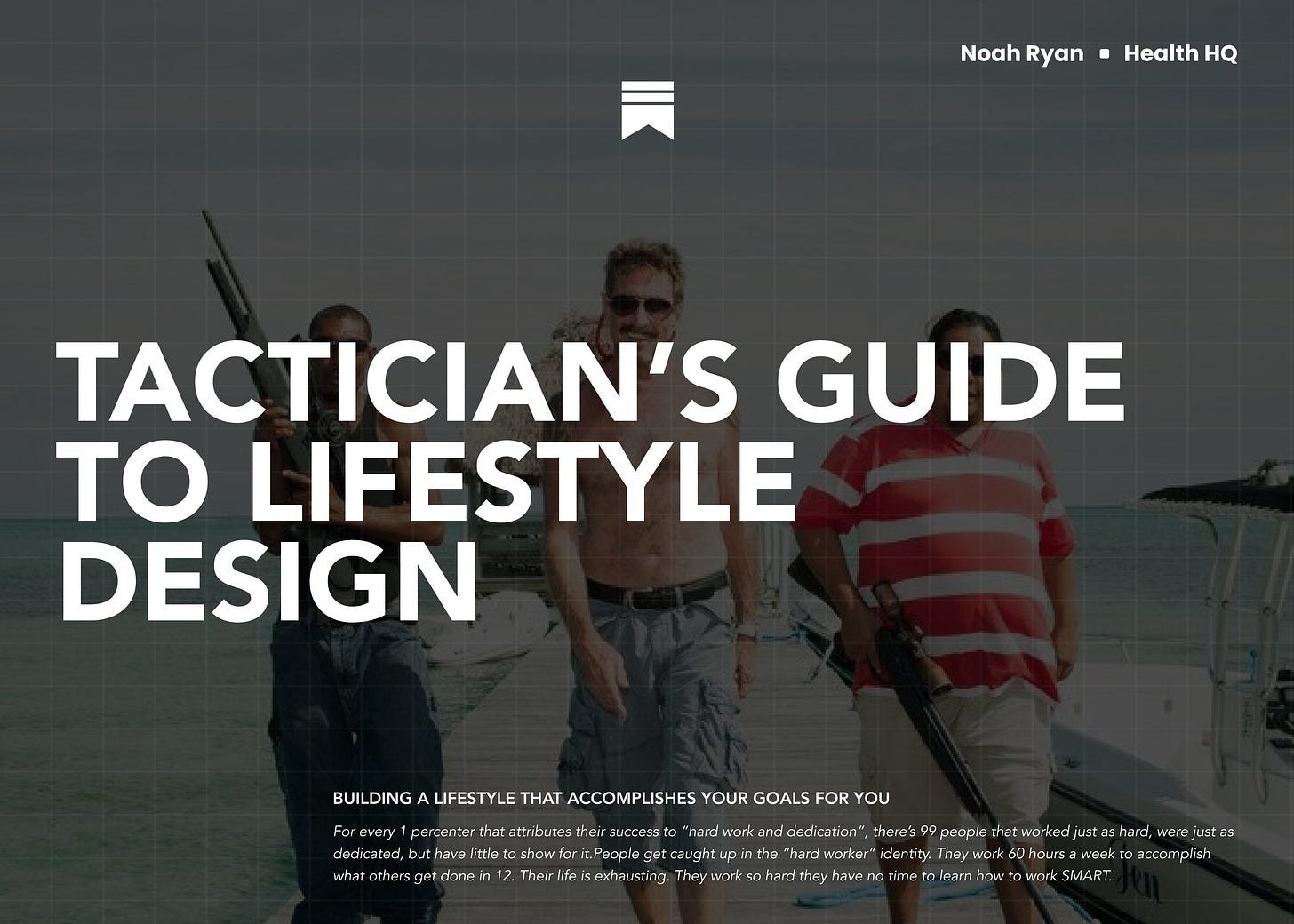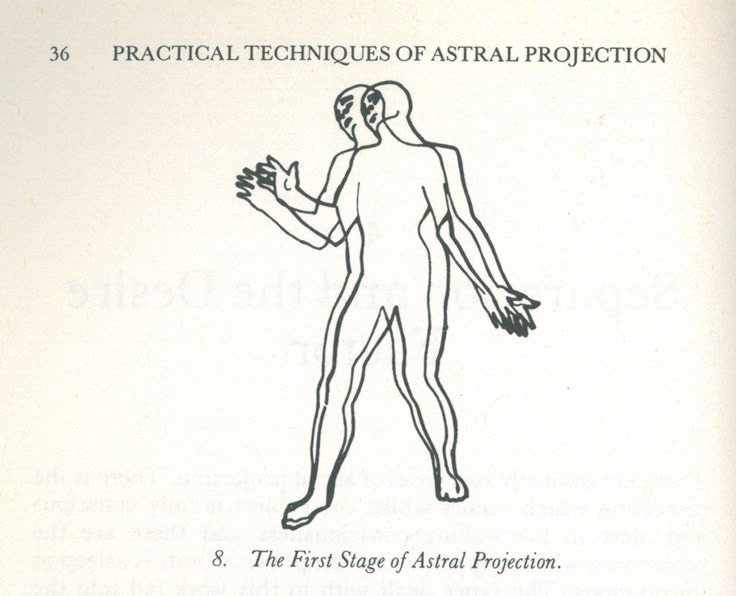The Tactician's Guide to Lifestyle Design
Designing a Lifestyle that Accomplishes Your Goals For You
Hard work is overrated. Sure it’s important, but it’s not a differentiator.
For every 1 percenter that attributes their success to “hard work and dedication”, there’s 99 people that worked just as hard, were just as dedicated, but have little to show for it. People get caught up in the “hard worker” identity. They work 60 hours a week to accomplish what others get done in 12. Their life is exhausting. They work so hard they have no time to learn how to work SMART. They stick with inefficient systems for years simply because that’s how they always do it.
These guys always burn out. They wreck their health, happiness, and quality of life. But for what? Nonsense. Climbing faster up a mountain doesn’t matter if it’s the wrong mountain. Working harder doesn’t matter if you’re working on the wrong things.
This bleeds over to life as a whole. Most people grind away, never asking whether they’re playing games they’re uniquely suited to win. They stay in suboptimal environments, build habit out of ineffective routines. They lack creativity, they accept the status quo, and never consider there may be a better, easier way to get to their end goal.
They’re rowing up shit’s creek without a paddle. Gnashing and gnawing against their vices. They try to eradicate their bad qualities instead of integrate. They’re playing life on nightmare mode for no reason at all.
I’m going to share with you how I turned the game of life on easy mode. A system to accomplish all your goals on auto-pilot. A tangible guide to lifestyle design.
I’m going to show you the exact 6-step framework to design a lifestyle that makes failure effectively impossible.
Shall we?
Know Yourself
Most people simply don’t know how to observe themselves objectively. They’re afraid to dive deep into their psyche lest they run into something they don’t like. They approach their faults with shame instead of curiosity. This is the number one thing keeping people back: the inability to view themselves objectively. To take inventory on who they are. To map out their behaviors and tendencies.
I used to be a highly reactionary individual. Zero self-control, inflammatory, aggressive. I was a slave to my emotions. That was until I learned how to observe myself objectively. I spent six months doing guided meditations daily during lockdown. After a while, I learned to observe my emotions instead of being consumed by them. I could view myself from third person, segmenting myself and my brain.
I turned myself into a science experiment, documenting all my behavior, thoughts, and actions like a researcher observing a lab rat. I compounded this by obsessively studying the ADHD brain, Jungian archetypes, and assorted readings on human psychology.
By the end of that six-month period, I had a near-definitive snapshot of who I was. Now that I knew this, I could strategically create an environment, lifestyle, and routine that complemented who I was.
I stopped playing games I was supposed to play and started playing games I was uniquely suited to win. No longer was I a slave to my emotions. My compulsive behaviors vanished and I finally felt in the driver’s seat of my own life.
What I Learned
I learned more about myself in six months than most learn in 10 years of therapy:
What gives me energy
What drains energy
My core values
My weaknesses
My optimal daily rhythm
My potential
My limits
I finally knew how my brain worked. I stopped complaining about my faults and simply built around them in order to reach my goals. Now that I had this information, I could start implementing it in my life.
Note: There is no such thing as good and bad traits. Traits are traits. Hone them properly and they work for you, let them manifest negatively and they work against you. The same trait that makes me inattentive and scatter-brained makes me elite at connecting dots and generating ideas. This is why I focus on strategy and not accounting.
Remove Baggage
Most people hold onto things that no longer suit them. Things, habits, routines, visceral reactions, emotional baggage. You gotta purge all of that. I went so far as to get rid of 99% of my stuff and move to a foreign country, but you don’t have to do that.
Simply take inventory of your life and figure out what baggage no longer serves you. Where are you working against yourself? Obsessing over politics? Hoarding T-shirts? Housing a pint of ice cream a night?
When I’m coaching people, I always tell them that WE are coaching them. I go so far as to address them in third person. You can’t get through to somebody who is emotionally tied to the subject at hand. Bring up their faults and they get defensive, ashamed, or straight up shut down. The key is to treat yourself as somebody you’re responsible for. Like a direct report in the corporation that is you. You are playing manager and operator at the same time, and need to know when to switch between the two.
Once you get rid of that knee-jerk emotional reaction to your behavior, you can get creative with it. Every fault is an opportunity for a new strategy. It’s all one big game of Sims. Once you get a few wins, you’ll be hooked on personal development. You’ll sniff out inefficiencies in your life with drive and vigor. No hurdle is too big when you’re playing strategist.
Map Your Goals
By this point, you should have a clear understanding about what really drives you. What you want to accomplish and why. Accomplishing these goals is as simple as:
Removing anything that detracts you from reaching your goals
Crafting a lifestyle that makes achieving said goals inevitable
It’s easiest to start with your immediate environment. If your goal is mental clarity, find things that distract you and remove them. Take willpower out of the equation:
Simplify your wardrobe (reduce decision fatigue)
Streamline your work routine (minimize cognitive switching tax)
Get rid of ALL junk (free up mental real estate)
Set the table, so to speak. This makes room for intentionality.
Staying in Sandbox Mode
The Goggins-type, life or death, masochistic self-development model is broken. You’re bound to fall off the bandwagon at some point. Instead of being hard on yourself and self-flagellating, use that failure as an opportunity to learn more. Why did you mess up? Is there too much friction with your current routine? What roadblocks are making hitting your goals difficult? There is no deadline on creating an optimized life. Nothing is really that make or break, all that matters is progress and intentionality.
Don’t rest your laurels on hard work. Strive for alignment. Everything you do should be fluid and natural. No rigidity, just flow. If you can accomplish this, all your goals will be baked in.
Optimize Your Environment
You wouldn’t put a monkey in an aquarium, why are you settling for an environment that doesn’t suit you? I know myself well enough to know that I need:
Close proximity to nature
Minimalist, uncluttered space
Lots of sunlight
A vibrant, varied daily routine
Daily creative expression
Ample physical activity
If any of these are missing, I become a nihilistic asshole. Call me fragile, I don’t care. Being able to “live anywhere” and “do anything” is cockroach coded.
Because I know what I need, I’m willing to give up what I don’t. I don’t need a vibrant nightlife, a restaurant scene, or nice amenities. I don’t need a nice car or nice clothes. If I find myself gravitating towards what OTHERS want, I know I’m losing the plot.
Make sacrifices for things worth sacrificing for.
Tangible Examples
Example 1: Healthy Home Maxxing
You’re in your house every day, why wouldn’t you make it as effortlessly optimized as possible? If you do something every day, find a way to optimize it.
You sleep every day → get organic sheets and blackout curtains
You breathe air every day → get an air filter and snake plants
You shower every day (hopefully) → get a shower filter
You eat every day → stay loaded on healthy snacks, don’t allow junk food in the house
You work every day → get an ergonomic setup
You use lights every day → get circadian-friendly incandescent light bulbs
Educate yourself. Most people are willfully ignorant to all the things getting in the way of their goals then make random excuses. That shit doesn’t fly anymore.
Example 2: Learning a New Language
I wanted to learn Spanish, so I lived in Spanish-speaking countries for three years. Instead of taking lessons, I did things I already wanted to do, just in Spanish:
I journal every day, so I translated my journals into Spanish
I socialize every day, so I started socializing with Spanish speakers
I watch YouTube every day, so I put on Spanish subtitles
I use my phone every day, so I changed my settings to Spanish
I listen to music every day, so I listened to Spanish music (and sang along)
At no point did I grind. I just changed my routine, environment, and lifestyle to accomplish my goal via osmosis. I now speak Spanish muy bien and crush it at Cumbia Karaoke.
Example 3: Fitness Consistency
I have a hard time with consistency. I get bored easily and am particularly spontaneous. So instead of staying with a strict regiment, I took the opposite approach. I have no workout routine. I train what I want to train when I want to train. If at any point I don’t want to train, I figure out why and redesign my style to make it enjoyable. This has enabled me to keep S-tier fit for a decade.





